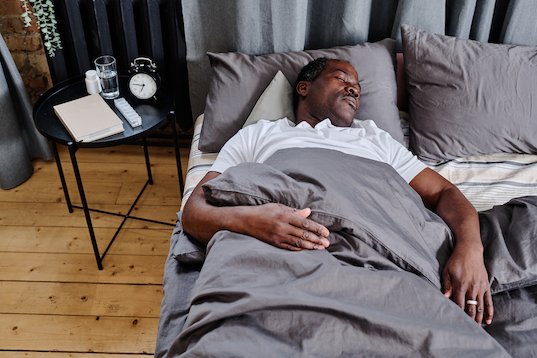Get Good Sleep — Your Heart Depends On It
A good night’s sleep may offer immediate benefits like improved energy and mood, but those are just the beginning. Research shows that getting quality sleep can make you less likely to develop depression, type 2 diabetes, and heart disease. In fact, the science behind sleep is strong enough that the American Heart Association added it to their checklist of what’s essential for heart health. [1, 2, 3]
How does sleep affect heart health?
Managing your blood pressure is one of the best ways to protect against heart disease and sleeping can help. Your blood pressure is lower when you’re asleep than when you’re awake. That means that the time you spend sleeping contributes to lower overall blood pressure. [4, 5]
Since high blood pressure is one of the biggest risk factors for heart disease and impacts 1 in 3 adults in America, managing it with good sleep and other habits is essential for your heart health. [6]
Getting good sleep can also help you stick to other healthy habits that are important for your heart and overall health, like eating well and exercising regularly. Research shows that not sleeping well may make you crave foods higher in sugar and saturated fat. This can create a situation where poor sleeping leads to poor eating habits, and poor eating habits make it harder to get good sleep. The same cycle can happen with physical activity — it can be harder to exercise when you’re tired harder to sleep without enough exercise. [3, 7]
What is good sleep?
Good sleep doesn’t just mean getting 7-9 hours (although that is important). It also means having a consistent sleep schedule. Studies have shown that older adults who go to sleep at the same time and get the same number of hours each night are less likely to develop heart disease than those with less consistent sleep patterns. [3, 8]
Here some steps you can take to improve your sleep patterns:
Set a sleep schedule: Commit to consistent sleep by getting clear about what time you intend to be in bed each night and up each morning. You might even set an alarm in the evening for when it’s time to prepare for bed.
Get natural light early in the day: If possible, get some sunlight early in the day. You can hit your activity goals and support good sleep by taking morning or lunchtime walk.
Stay away from artificial light at night: Allow your body to prepare for bed by setting aside your technology devices in the evening.
Make your bedroom a comfortable sleep environment: Make sure your sleeping area is cool, dark, and quiet. [9]
If the feeling after a good night’s sleep wasn’t enough, hopefully the health benefits help you commit to quality sleep. If you have a condition that make it hard to sleep like sleep apnea or insomnia, ask your doctor about ways you can find relief. Remember: sleep is not a treat, it’s essential for your heart and overall health. [9]
1. Data and Statistics: Short Sleep Duration Among US Adults. Centers for Disease Control and Prevention.
2. Sleep and Chronic Disease. Centers for Disease Control and Prevention.
3. American Heart Association adds sleep to cardiovascular health checklist. American Heart Association.
4. Prevent and Manage High Blood Pressure. Centers for Disease Control and Prevention.
5. Sleep and hypertension. Calhoun DA, Harding SM.
6. High Blood Pressure. Centers for Disease Control and Prevention.
7. Exercise and Sleep. Sleep Foundation.
8. Older adults with irregular sleep patterns may face higher risk of hardened arteries. American Heart Association.
9. How Does Sleep Affect Your Heart Health? Centers for Disease Control and Prevention.

